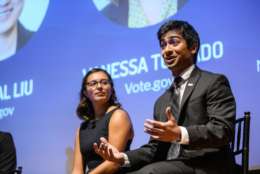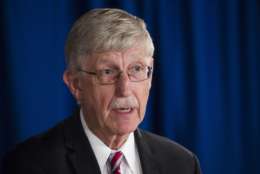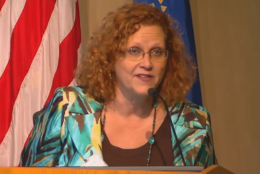National Institutes of Health
-
Many of students in this year's Civic Digital Fellowship program this summer said they were inspired by the impact they had to make a difference on the products and services the American people use every day.
August 13, 2019 -
Agencies have new guidance from the Office of Personnel Management advising them to evaluate how well their telework and other work-life programs are working. Several departments have opted to limit or alter their telework programs since initial pilots were stood up back in 2012.
July 17, 2019 -
NIH director Francis Collins joined Federal Drive with Tom Temin to discuss the responsibility of scientific leaders to end harassment and advancement barriers for women.
July 08, 2019 -
Even as the National Institutes of Health wrap up this round of digital transformation, the strategic plan for the next five years is already being developed.
April 25, 2019 -
Evaluating and improving employee engagement gets easier with a tool from a small team of senior leaders at the National Institutes of Health. And the team is determined to share that tool and their vision across government.
April 16, 2019 -
In today's Federal Newscast, auditors at the Government Accountability Office say the Homeland Security Department has made considerable progress towards fixing management weaknesses.
April 05, 2019 -
With the resumption of moon missions and plans to launch people to Mars, sustaining life and good health in space and for a long time is becoming a federal priority.
March 11, 2019 -
A new procurement notice details DHS’s plans for the third version of EAGLE announced by Soraya Correa, DHS' chief procurement officer, late last year.
March 04, 2019 -
Aileen Black, Google’s executive director and industry lead and group leader for the U.S. government, left the company after more than two years.
February 26, 2019 -
Andrea Norris, the chief information officer at the National Institutes of Health, said her agency is investing heavily in people, tools and cloud services to take more advantage of data.
February 22, 2019 -
Federal government lapses in funding have become a regular occurrence. But only rarely have they lasted more than a weekend.
January 09, 2019 -
The more accessible and standardized the data, the faster and better research can take place. That's in part the idea behind a National Institutes of Health information technology initiative known as STRIDES.
December 18, 2018 -
The National Institutes of Health has expanded an initiative known as the Brain Research through Advancing Innovative Neurotechnologies.
December 11, 2018 -
Jothi Dugar, the NIH’s clinical center’s chief information security officer, said she is using the agency’s Diversity of Science effort to increase the number of women in cybersecurity.
November 29, 2018 -
AI research aims not just for brain-like intelligence but also the brain's low power requirements.
November 29, 2018













